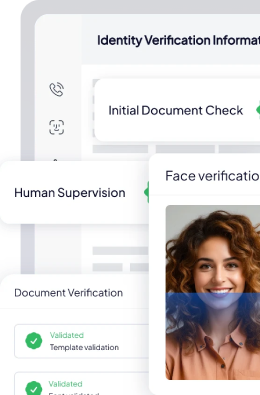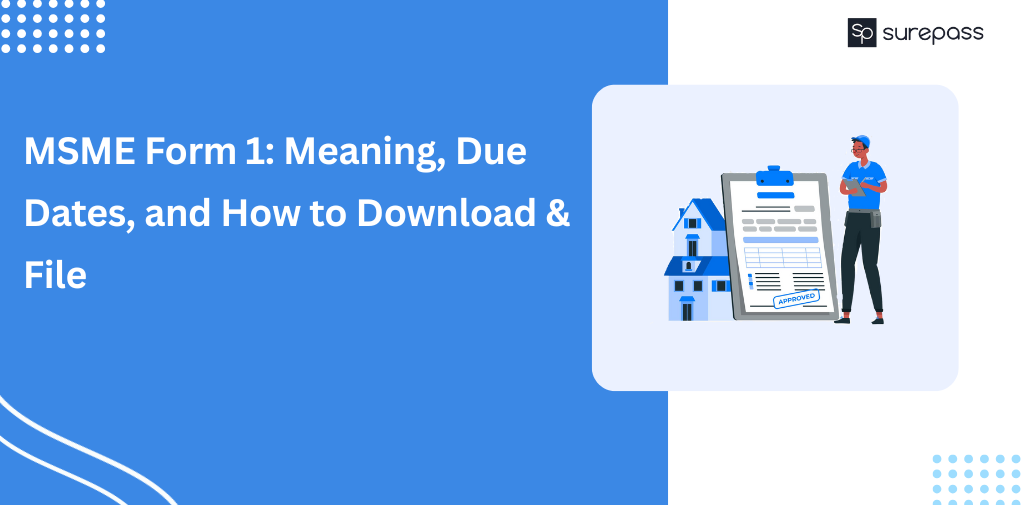Aadhar API
The Aadhar Verification API addresses the critical requirement for precise identity verification, especially in light of rising identity theft and cybercrime. It uses Aadhaar, a unique 12-digit identification number provided by the Indian government that is linked to an individual’s biometric data such as fingerprints, face, and iris scans, to verify identity. This verification is an important part of the Know Your Customer (KYC) process, which aims to reduce identity fraud risks and remove duplicate or fraudulent identities. Aadhaar API verification is widely used in areas like banking, telecommunications, government services, e-commerce, and logistics. It is essential in processes such as employee onboarding, third-party engagement, and commercial relationship formation.
Aadhaar Authentication API- Role in KYC verification.
The Aadhaar Verification API makes KYC verification easier, allowing businesses to complete transactions safely, rapidly, and intelligently. It reduces what was formerly a week-long procedure to a matter of minutes, improving both efficiency and security. This API helps companies and financial institutions establish client trust by confirming vital information such as complete name, address, cell phone number, and other pertinent data.
Aadhar Verification API- Usage and Benefits
The use of Aadhaar Verification API provides several benefits across sectors. Some of the main benefits include:
Identity Verification
This API is critical for industries such as banking, telecommunications, and government services, as it assures correct identity verification, prevents fraud, and maintains transaction integrity.
Fraud Prevention Aadhaar Card fraud is a serious issue, with the potential for major financial loss and reputational harm. The Aadhaar API Verification API tackles this issue by validating Aadhaar Card information, identifying fake or manipulated cards, and lowering the risk of identity theft and unauthorized access to services.
Automate your KYC Process & reduce Fraud!
We have helped 200+ companies in reducing Fraud by 95%
Regulatory Compliance
Many sectors are required by regulatory agencies to verify Aadhaar cards for certain transactions. The API helps to ensure compliance with these regulatory obligations and prevent fines for noncompliance.
Efficient Service Provisioning The inclusion of this API simplifies service provisioning operations. Businesses that automate Aadhaar Card details verification can enroll clients more quickly and effectively, improving operational efficiency and overall customer experience.
Data Integrity and Security
A direct link to the UIDAI database via the API ensures the integrity and security of Aadhaar Card information. It assures that the data obtained is correct and tamper-proof, which improves data security and reduces the possibility of data breaches or unauthorized access.
Seamless Integration
The Aadhaar Verification API is intended to work with a variety of platforms and systems, allowing for seamless integration into existing infrastructures. Customers benefit from this functionality since it makes the verification process easier and more efficient.
Trust and Credibility
Using the Aadhaar Verification API displays a company’s commitment to ensuring secure and dependable transactions. This method fosters consumer trust and credibility, as they feel more secure knowing their Aadhaar Card information is appropriately checked and preserved.
Aadhar Verification API- It’s Evolution
Know Your Customer (KYC) has become an essential component of financial transactions and identity verification in India. Customers must go through the KYC process before they may create bank accounts, update personal information, invest in mutual funds, or engage in other financial transactions. The KYC procedure has evolved significantly over time to meet the demands of the digital era while also improving security and efficiency.
Finance Minister Nirmala Seetharaman delivered the Union Budget 2023-24, which emphasized the necessity of simplifying KYC processes and reflected a change towards a more efficient, risk-based strategy. This concept seeks to use digital infrastructure, such as the government’s digital locker, to store crucial papers like PAN and Aadhaar, allowing for a more dynamic KYC procedure.
Furthermore, India’s fintech sector, which is expected to grow to $1.3 trillion by 2025, is gradually integrating digital public infrastructure, such as Aadhaar and UPI (Unified Payments Interface), for KYC and other services. This integration represents a paradigm change in the financial services environment, making KYC processes more accessible and secure for a large audience.
The progress of KYC in India, particularly with the inclusion of Aadhaar Verification APIs, demonstrates the country’s dedication to improving the security and efficiency of identity verification. This not only strengthens the financial sector against fraud, but also prepares the door for more equitable financial involvement, reflecting India’s continuous transition to a more digitized and secure economic ecosystem.
Aadhar Card Verification API- Significance
As of 2023, the Aadhaar system has grown into an important part of India’s financial infrastructure, with over 1.3 billion registered users. This broad reach has transformed the delivery of digital services, notably in the area of electronic Know Your Customer (eKYC) for financial institutions.
Aadhaar eKYC, a vital component of this change, is an online method for verifying an individual’s identification using their Aadhaar number. This unique solution eliminates the need for tangible papers, expediting and simplifying the verification process for both enterprises and consumers.
The use of Aadhaar eKYC provides several benefits. It provides speed and convenience by reducing the verification procedure to a few minutes, eliminating the need for extensive documentation and actual visits to financial institutions.
This efficiency greatly decreases the expenses associated with client onboarding and KYC compliance by eliminating the requirement for physical documentation and human identity verification procedures.
Aadhaar eKYC uses biometric and demographic data, which improves the accuracy of identity verification as compared to previous techniques that rely on physical papers. This precision is critical in lowering the danger of fraud and identity theft, assuring safe financial transactions.
Furthermore, Aadhaar eKYC has played an important role in promoting financial inclusion, particularly in rural regions where traditional KYC processes were sometimes a barrier. This inclusiveness is evidenced by the fact that 85% of Indian customers prefer Aadhaar eKYC over traditional KYC methods.
The Reserve Bank of India’s directive that all regulated financial institutions use Aadhaar eKYC for client onboarding by 2024 emphasises its relevance. This decision underscores the government’s commitment to digital transformation in the banking industry.
Furthermore, India’s fintech sector, which is expected to grow to $1.3 trillion by 2025, is using Aadhaar eKYC to create novel goods and services such as digital lending platforms and mobile payment apps.
This invention demonstrates the Aadhaar system’s influence on the financial environment, representing a substantial transition towards a more inclusive and digitally empowered economy.
Conclusion
Aadhaar Verification API is a critical step for all financial institutions and businesses who require an API for Aadhaar card authentication. This is the most fundamental identification required everywhere. The Aadhaar card, issued by the Government of India, contains information such as your full name, address, mobile number, and other data that may be used to verify an individual.
The Aadhaar authentication API is a useful tool that may deliver accurate findings on the authenticity of an Aadhaar card. The online Aadhar Card verification tool is straightforward and user-friendly. All you need is the Aadhaar card data. Simply input it, and the results will appear on your screen within a few seconds. Because Aadhaar cards are a required form of identification, it is strongly advised to validate them using Aadhaar Verification APIs.





